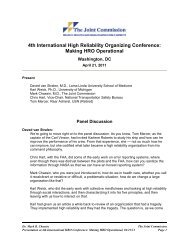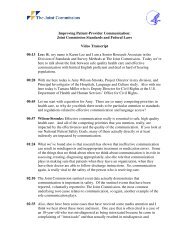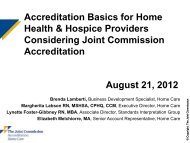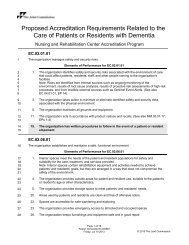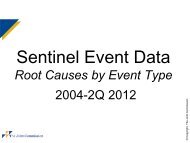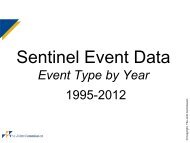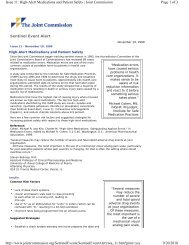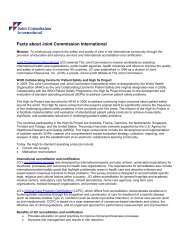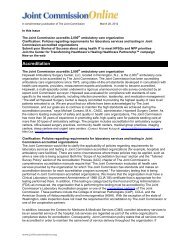Keeping Your Hospital Property Smoke-Free ... - Joint Commission
Keeping Your Hospital Property Smoke-Free ... - Joint Commission
Keeping Your Hospital Property Smoke-Free ... - Joint Commission
You also want an ePaper? Increase the reach of your titles
YUMPU automatically turns print PDFs into web optimized ePapers that Google loves.
KEEPING YOUR HOSPITAL PROPERTY SMOKE-FREE:<br />
Successful Strategies for Effective Policy Enforcement and Maintenance<br />
Case Example: Some hospitals created innovative, novel<br />
strategies to support smokers compassionately through the<br />
policy implementation process. One large health system in a<br />
suburban setting offered tobacco cessation medication to its<br />
employees at no cost, established “quit centers,” offered 15<br />
“How to Make it Through the Day” seminars to assist those<br />
who were not planning to quit using tobacco, and had a<br />
24-hour hotline for support. They also provided cash-back<br />
incentives and employed a hypnotist. Care packages were<br />
prepared with puzzles, a stress ball, and a coupon for a free<br />
soft drink to distribute to smokers. These gifts and resources<br />
helped support their employees through the workday and<br />
allayed concerns that the policy was adopted to punish smokers.<br />
Be consistent.<br />
If employees already feel targeted by the smoke-free policy, imagine<br />
how much worse they will feel if it is applied unevenly. Do your best<br />
to ensure consistent enforcement of the policy, including provisions<br />
affecting whether employees can smoke during break times, across<br />
all departments, locales, and shifts. Perceptions of unequal or unfair<br />
treatment could undermine effective enforcement.<br />
“For us it was making everybody<br />
responsible for the policy. It<br />
was not just the directors or the<br />
administrators, it was everybody,<br />
and they were given credit if<br />
they approached someone in a<br />
non-confrontational manner and<br />
informed them of the policy. We<br />
had education around that and we<br />
have these ‘excellent job’ cards<br />
that are given as incentives. If<br />
we saw an employee approach<br />
someone or heard about it, we’d<br />
give them a card. And actually if<br />
they didn’t it could count against<br />
them. If we knew that they saw<br />
someone smoking and didn’t do<br />
anything about it, that would be a<br />
strike against them.”<br />
Director of Quality Management, small<br />
hospital in a suburban setting<br />
11



